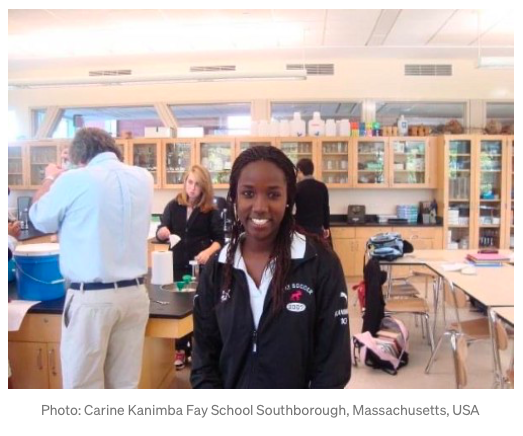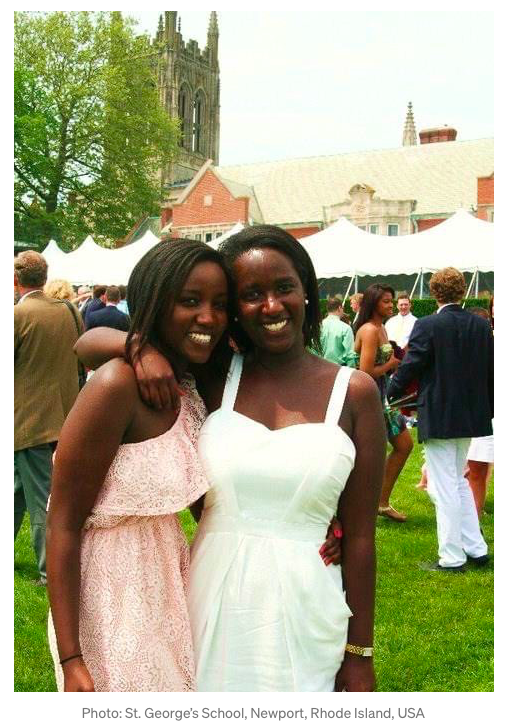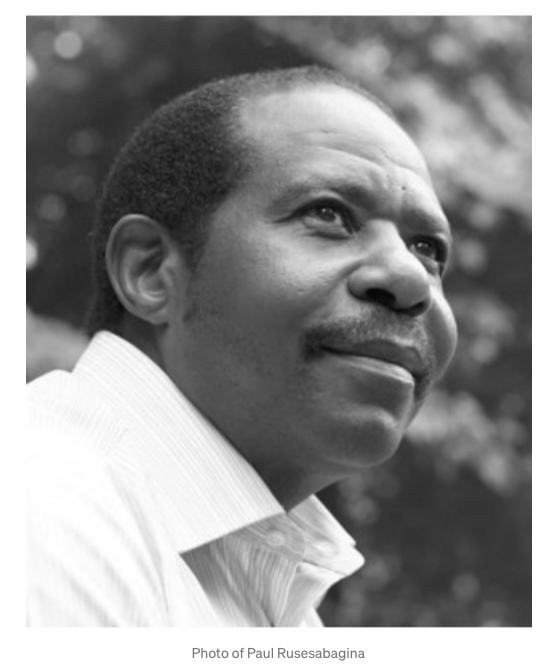Dear Ange,
I hope that this letter finds you well. My name is Carine Kanimba, I am the daughter of Paul Rusesabagina. I would like to wish you a Happy New Year and extend my best hopes that your 2021 will be filled with light.

Given the circumstances, it may seem strange for me to reach out to you. But I recognize that we share similar values, experiences, and histories. We both studied in prep schools on the east coast of America and grew up being educated on the importance of values, hard work, and compassion. Our brothers even played basketball against each other in school. We also both occupy a unique position as the daughters of some of the most high-profile Rwandans in the world. It’s an honor and a heavy burden to represent our home in such a public and influential way. It is unfortunate that my first outreach to you comes at a time of division and struggle for our nation, especially given that our fathers occupy so much of that conversation right now.
I wanted to write to you because I believe that you and I can work together to both honor our fathers and our country. Our world has just endured a massive collective trauma and permanent paradigm shift because of the COVID-19 pandemic and the worldwide protests for civil rights that emerged in 2020. This year, we will be picking up the pieces and attempting to discover what’s next — just like everyone else. We were both educationally raised on the words and legacies of leaders who inspired their communities and the whole world during similar times of turmoil and change.
Those leaders — great moral giants like Martin Luther King Jr., Harriet Tubman, and Nelson Mandela — taught us the unalienable value of speaking out against injustice, fighting for a better future, and believing that humanity deserves peace, especially in its darkest hours. It was Mandela who asked the world to consider the legacies that they would inherit and later leave. “When the history of our times is written, will we be remembered as the generation that turned our backs in a moment of global crisis or will it be recorded that we did the right thing?”
This is a moment of global crisis, and you and I are, for reasons beyond our control, prominent faces of this new generation in Rwanda and across the world. We are building legacies that generations of younger leaders will later inherit, and we are standing in our own legacies right now because they were passed down to us from our fathers and from the icons we grew up admiring. Amidst a world facing deep reckonings about civil rights, public health, and justice, I am appealing to you to help me preserve a legacy for the next generation. We must not turn our backs on the forces of our global crises, we must forge ahead, even when older generations are at an impasse.

As you may know, my father has been detained in Kigali for over four months. He was taken to Kigali after getting on a flight to a different destination and being tied up, blindfolded, and flown to Rwanda. Rwanda’s diplomats have argued that it was “luring” and that he got on the plane of his own accord and therefore consented to whatever came next. You and I, as young women, know that this argument sounds procedural on paper but is really devoid of any justification or value. In the past decade, we have seen too many of our sisters and friends get into taxis or Uber rideshares expecting to be taken to their destination — a work conference in another city, a dinner with friends, a trip to the airport — like any other paying customer, and instead be taken elsewhere to be assaulted or harmed, and we would immediately dismiss an explanation of “but she got into the car willingly.”
Though I adamantly assure you that they are not true, my assurances may not be enough to convince you that my father is innocent of the crimes he was charged with after his kidnapping. I am not asking you to believe me, I am asking for your help in ensuring that this process has a chance to play out in a setting that did not begin with an international kidnapping, and denial to his own chosen counsel for over 90 days.
You believe that it is your father who is speaking up against injustice, and you and I both recognize the value of that commitment to stand strong against wrongdoing. I ask that you put yourself in my shoes. If your father traveled internationally to speak and was “lured” onto a plane, physically restrained, taken to a different country against his will, and detained without the right to use his own counsel, would you not have the same concerns that I do? Isn’t it important and paramount to the future of Rwanda and how the world sees Rwanda to make sure our proceedings are unquestionably legitimate?
You and I have been, unbeknownst to us, preparing for this moment of global crisis our entire lives. How could we not? We grew up in a community where many of us, or our cousins and friends, lost one or both parents to a brutal genocide. In my case, it was both of my parents. I recognize your devotion to truth, reconciliation, and peace comes from witnessing and experiencing the same kind of violence and trauma. The people of Rwanda, and especially the young leaders of Rwanda, have been coping with a societal shockwave of violence for decades. We have painstakingly cultivated global genocide awareness, truth and reconciliation projects, and discussions of healing and forgiveness to cope with the unimaginable horror that was the Rwandan Genocide. Now, the world is at a breaking point of division, of a public health crisis that’s killed millions, of a global cry for justice and an end to state violence that started with #BlackLivesMatter and has touched every corner of the planet since then.
When we come out of this crisis period, other countries of the world will have no idea how to cope with mass societal trauma. But we do know how to cope, because we’ve done it our whole lives. We are built for this moment. It’s our responsibility to our ancestors, to our families, to ourselves, to our children, and to the future to make sure that Rwanda is positioned to share its lessons and lead here. To do that, Rwanda must be a beacon of peace, compassion, and fairness.
My father is a cancer patient in remission and has a cardiovascular condition. He is incredibly high-risk for COVID, has lost a significant amount of weight, and in phone calls from his prison in Kigali, he has expressed that he is ill and dizzy. International human rights groups and legal advocates have urged countries to not continue pre-trial detention for high-risk individuals like he is. Given the concerning and unjust nature of my father’s procurement and detention, I am asking you to please advocate that your father releases him to Belgian or US custody.

Let us show the world that Rwanda was responsible and fair to its prisoners during the COVID pandemic. Let us show them that Rwanda’s processes are predicated on fairness, and if a step in the process has been compromised, that justice will not go down with it. Let us show them that Rwanda believes in itself and its legitimacy enough to bring charges internationally — especially on charges that will have a global impact.
Neither of us has to believe the other to accomplish this. We just have to believe in our values and our ability to bring the world out of darkness.
I am happy to talk with you further. Again, best wishes for your New Year. I hope that we can work together.
Carine I. Kanimba




























































